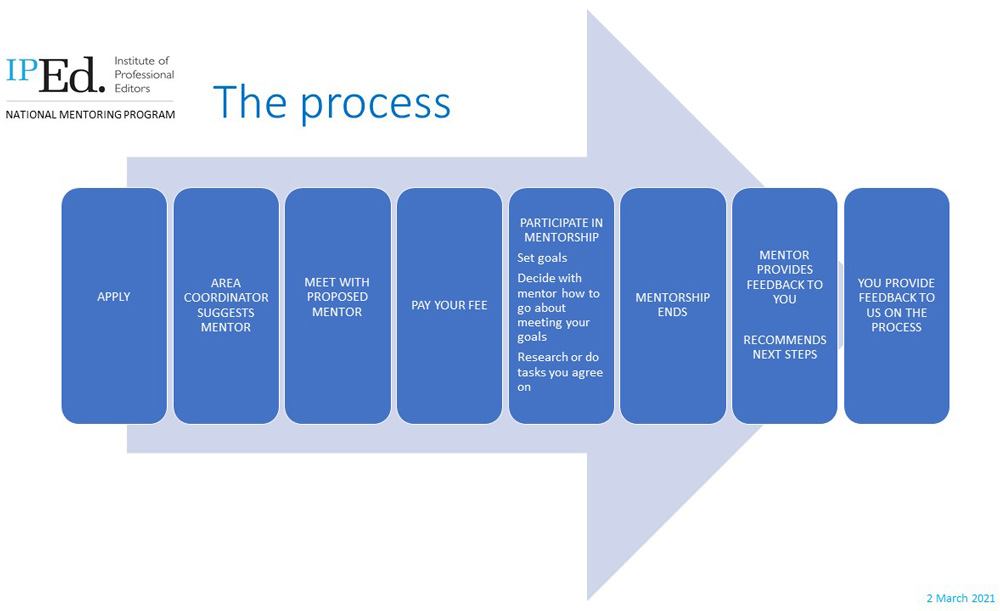IPEd’s Mentoring Program
by Paul Anderson
Ted Briggs AE and Elizabeth Manning Murphy DE co-founded the IPEd Mentoring Program for editors, which evolved from a pilot program instituted by the Canberra Society of Editors (CSE) in 2012. Both remain heavily involved: Ted as Program Coordinator; Elizabeth as Co-Chair of the standing committee.
Ted presented an overview of the IPEd Mentoring Program at the Editors NSW member meeting on 2 March 2021. Elizabeth provided answers to some of the questions at the end.
He began by acknowledging all eight current area coordinators, describing them as ‘the lifeblood’ of the program. There have been about 80 mentorships since inception, approximately 10 a year.
Mentoring is where one individual provides support, encouragement, and advice to another, based on their knowledge and life and experience relative to the mentoring theme.
The IPEd Mentoring Program is semi-structured. There is a formal structure around applying for and being matched with a mentor/mentee, but almost complete flexibility in what the mentorship covers and how it is conducted (one of its strengths). Ted stressed it provides a two-way learning experience for both mentor and mentee and this is commonly reflected in feedback from mentors.
The program is for members of IPEd and CSE, at any level of membership, with at least some experience in editing. This includes, for example, someone returning to the profession after time off or moving to a new area of editing.
No topic is out of bounds so long as it is related to editing. Fiction editing, setting up a freelance business, academic editing and preparation for the accreditation exam are popular. (IPEd is seeking new/additional mentors for these topics.)
Mentoring fits on the spectrum of professional development. Ted differentiated it from training and coaching: mentoring is transformative, mentee-driven, and non-evaluative, with flexible goals and mutual learning.
Ted described what mentors and mentees do, and busted five myths about mentoring:
- Informal mentoring goes on all the time, so we do not need a formal structure.
It is possible to select someone who is too much like yourself. - Mentoring is only for people starting out in the profession.
Professional development occurs throughout your career. - The mentor must be older or more senior than the mentee.
Experience is often confused with age/seniority. Reverse mentoring is encouraged in the program. (IT was the topic example given.) - The mentor runs the mentorship.
Definitely not. The key to a successful mentorship is for the mentee to take responsibility for their learning. - Mentoring is time-consuming.
It does take a certain amount of time and energy but there is a lot of flexibility. There is no set period. Mentorships generally run for a total of eight hours (equivalent face-to-face time) over three to six months, but this varies.
Mentors need knowledge, experience and skills that they can share, a passion for helping others achieve their goal and a desire to give back to the profession. They do not need to be an AE or a DE, old and wise, or the top expert in their field. Mentors need to be open to the idea that they do not have all the answers. Initial training is provided for new mentors.
Ted explained how the process works. There is a small program fee for mentees. What is discussed in the mentorship is confidential.

IPEd conducted an internal review of the program in 2020. It found the program has a solid foundation and there is commitment, but administration is manual and it operates with little direct support and promotion (a reflection of its history).
The key recommendations were to:
- Keep the flexible model.
- Streamline processes to make better use of IPEd systems and admin resources. (Work in progress.)
- Develop an engagement strategy with mentors: catch-ups twice a year, networking events, follow-on training, for example.
- Boost the area coordinator’s role and provide more support.
- Develop a marketing strategy integrated across IPEd. (Work in progress.)
- In the longer term, expand the range of mentoring types to include lower-cost/mini-mentoring, peer mentoring (mentor/mentee swaps) and more intensive mentoring for specific areas.
To find out more about the IPEd Mentoring Program, please go to the website page.
To apply to be a mentor or mentee, ask about the program or contact your area coordinator, please email mentorship@iped-editors.org.

